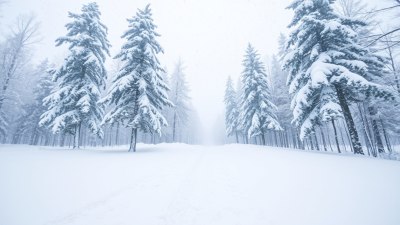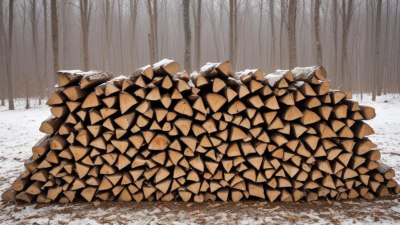Why Some Lakes Never Freeze Even in Harsh Winters
Discover why certain lakes remain unfrozen during winter's harshest conditions.

Image by evening-tao on Freepik
The mesmerizing beauty of frozen lakes in winter creates an illusion of serenity, yet not all bodies of water succumb to the icy grip of winter. Some lakes, regardless of their geographic location or the severity of the winter, refuse to freeze. This phenomenon raises numerous questions about the science behind lake freezing and the unique characteristics of certain lakes.
Understanding Lake Freezing
Before delving into why some lakes don’t freeze, it’s essential to understand how lakes typically freeze. The freezing process begins with the air temperature dropping below the freezing point of water (0°C or 32°F). The surface of the lake cools, and as the water's temperature decreases, its density increases until it reaches 4°C (39°F). At this temperature, water is at its heaviest and sinks, while the surface water can continue to cool until it freezes.
Factors Affecting Lake Freezing
Several factors influence whether a lake will freeze. These include water depth, water movement, salinity, and local climate conditions. For instance, shallow lakes tend to freeze more quickly because there is less water to cool down, while deep lakes often resist freezing due to their larger volume of water and subsequent heat retention. Lakes with flowing water, such as those fed by rivers or streams, are also less likely to freeze completely because the continuous movement prevents ice from forming on the surface.
Heat Retention in Deep Lakes
Deep lakes, like Lake Superior and Lake Tahoe, can have unique properties that prevent freezing. These lakes maintain a stable thermal profile, where the water at the bottom is insulated from the cold air above. The water may remain warmer than the freezing point, which keeps the upper layers from freezing. This thermal stratification occurs more prominently in larger lakes where the volume of water is significant enough to combat temperature fluctuations caused by the atmosphere.
Mineral Composition and Salinity
Another critical factor affecting whether lakes freeze is their salinity and mineral content. Lakes with higher concentrations of dissolved minerals, such as salt, have a lower freezing point than freshwater lakes. The Great Salt Lake in Utah, for example, remains largely unfrozen during winter due to its high salinity levels. The presence of other minerals can also impact freezing thresholds.
Unique Geographic Locations
The geographic location of a lake plays a vital role in determining whether it freezes. Lakes situated in areas with milder climates often experience warmer temperatures during the winter months, preventing ice formation. For instance, some lakes found in temperate zones or near coastal regions may benefit from warmer ocean currents or prevailing winds that keep them from freezing over. It is essential to consider the microclimates around lakes, such as those influenced by elevation, landscape, and proximity to large bodies of water.
Thermal Pollution and Human Impact
In some cases, human activities can also prevent lakes from freezing. Thermal pollution caused by industrial discharge, wastewater treatment plants, or power plants can introduce warmer water into lakes. This additional heat can disrupt the natural freezing process and lead to ice-free conditions in winter. Agriculture and urban development may also contribute to increased temperatures in nearby lakes due to runoff and landscape changes.
Biological Activity
The presence of active biological systems can also inhibit freezing in some lakes. Aquatic life, including fish and microorganisms, generates heat through metabolic processes. In a manner similar to thermal pollution, this biological activity can raise the water temperature enough to prevent ice formation, especially in warmer lakes rich in nutrients. Lakes that support abundant fish populations are more likely to remain ice-free due to the heat generated by the organisms living within.
Examples of Lakes That Rarely Freeze
There are several notable lakes worldwide that seldom freeze even in the harshest winters. One such example is Lake Michigan, one of the Great Lakes in North America. Due to its size, depth, and urban heat from surrounding metropolitan areas, it often does not freeze completely. Another example is the Caspian Sea, which can also be ice-free in winter despite its vast surface area. In contrast, smaller ponds and lakes in colder climates may freeze completely, highlighting the variability in freezing patterns across different bodies of water.
Climate Change and Its Impact
The ongoing impacts of climate change introduce another consideration in the discussion of lake freezing. As temperatures rise globally, the altered heat balance in many regions influences whether lakes will freeze. Prolonged warmer winters can lead to reduced ice coverage on lakes, changing ecosystems and affecting aquatic life cycles. Understanding these implications is critical for managing freshwater resources and modifying activities that rely on stable ice conditions.
In summary, the reasons why some lakes never freeze are multifaceted, stemming from a combination of physical properties, geographical variables, human impacts, and biological activity. As we continue to study the impacts of climate change, the characteristics of these unfrozen lakes may offer crucial insights into broader environmental systems. Appreciating the science behind why certain lakes remain ice-free can aid in broader conservation efforts and promote a more profound understanding of aquatic environments. Our fascination with these bodies of water not only deepens our appreciation for nature's mysteries but also illustrates the delicate balance between climate, biology, and human influence in shaping the world's waters.











